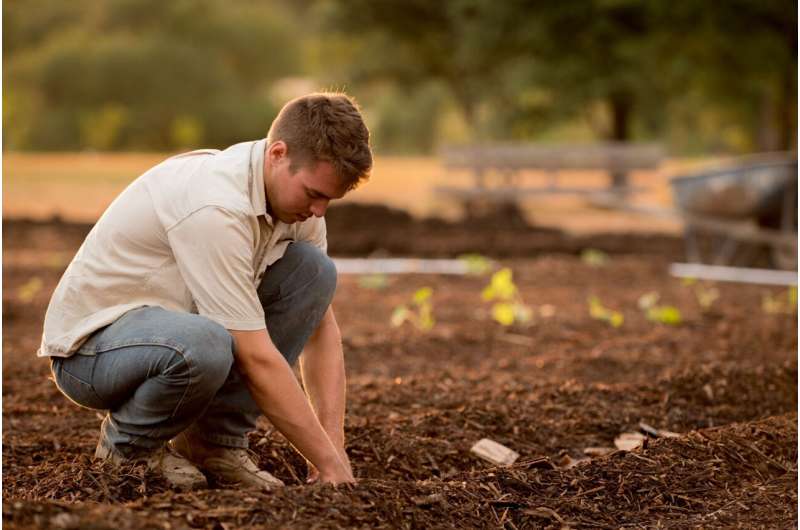This article has been reviewed according to Science X's editorial process and policies. Editors have highlighted the following attributes while ensuring the content's credibility:
fact-checked
peer-reviewed publication
trusted source
proofread
Farm stressors affect mental health of adults and adolescent children

Agriculture is a stressful occupation, and farmers face substantial mental health challenges. Research indicates they often experience higher levels of anxiety and depression compared to the general population, but less is known about the effects on their families. A new study from the University of Illinois Urbana-Champaign explores how economic stressors affect the mental health of U.S. farmers and their adolescent children.
The work is published in the journal Frontiers in Public Health.
"There's a lot of young people growing up on a farm and participating in agricultural work. We've long acknowledged the inherent hazards of this work environment, and now we're also recognizing its impact on mental health," said Josie Rudolphi, Illinois Extension specialist and assistant professor in the Department of Agricultural and Biological Engineering (ABE), part of the College of Agricultural, Consumer and Environmental Sciences and The Grainger College of Engineering at the U. of I.
"Most of the work on farm stress and mental health is primarily focused on adult farmers. However, it is important to recognize that children are fully aware of what's happening on the farm, and they are not immune to the stressors that exist. That is the inspiration behind this project," she added.
Rudolphi and co-author Richard Berg, analyst at the Marshfield Clinic Research Institute, are reporting results from the first year of a five-year study. The researchers conducted online surveys with farmers and their adolescent children across the United States. They used the Family Stress Model, which was developed in Iowa in the 1990s after the farm crisis to examine the correlation between economic stressors and mental health in farmers.
Rudolphi and Berg found that about 60% of both adults and adolescents met the criteria for at least mild depression, while 55% of the adults and 45% of the adolescents met the criteria for generalized anxiety disorder.
"Prevalence of depression in the general population is typically around 17 to 18%, so these numbers are quite high. Although we don't have a control group for direct comparison, we used similar instruments to screen for mental health conditions as national public health surveys. Additionally, these statistics are not unusually high for a farm sample, based on previous surveys with farmers," Rudolphi said.
When looking at economic hardship indicators, farm debt showed a high correlation with depressed mood in adults, and this in turn was correlated with adolescent depression and anxiety.
"It's not unexpected for children to be affected by the experiences of adults. In many other settings, adults can leave work, return home, and transition into their roles as parents. But in a farm environment, the boardroom table is the kitchen table, and there is talk about farm activity in the household. There's a blur between work and family, or business and residence, so it becomes rather complicated," she noted.
Interestingly, despite 82% of respondents rating their own mental health as excellent or good, their responses to questions measuring symptoms of anxiety and depression revealed different results. Rudolphi suggested people may have become accustomed to living with mild or moderate depression, perceiving it as their new normal.
The researchers are currently in their third year of data collection, and they continue to expand the number of participants. They aim to establish stronger connections between economic stressors and mental health in future data analyses.
One of the most important findings in the current study is the strong correlation between adult depression and adolescent depression, Rudolphi stated. This underscores the need to develop resources and services for the entire farm family.
"Illinois Extension offers a number of mental health programs for the agricultural community, but many of them primarily target the owner-operators. We must also consider the well-being of spouses and children on the farm," she said. "The agricultural environment prides itself on looking out for one another. We should harness that shared responsibility to foster a sense of community and support for young people. This involves engaging with rural schools, teachers, coaches, and agricultural youth leaders in mental health awareness initiatives."
Rudolphi is co-director of the North Central Farm and Ranch Stress Assistance Center, a 12-state, 15-partner collaborative based in Illinois Extension that offers stress management and mental health interventions.
More information: Josie M. Rudolphi et al, Mental health of agricultural adolescents and adults: Preliminary results of a five-year study, Frontiers in Public Health (2023). DOI: 10.3389/fpubh.2023.1056487


















